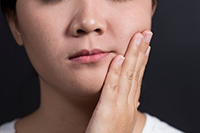 Gum bleeding is a common problem that many people face. It can be experienced daily, or it can be something that only happens occasionally. However, excessive gum bleeding can signify something more serious and should not be ignored.
Gum bleeding is a common problem that many people face. It can be experienced daily, or it can be something that only happens occasionally. However, excessive gum bleeding can signify something more serious and should not be ignored.
What Does Excessive Gum Bleeding Means?
If you notice bleeding gums more often than usual, it could signify something serious. Excessive gum bleeding can be a symptom of gingivitis, which is an early stage of gum disease. If you leave this untreated, gingivitis can lead to periodontitis, a severe condition leading to tooth loss. Therefore, if you see blood when you brush your teeth or floss, it is essential to see a dentist. In most cases, gum disease can be successfully treated with professional cleaning and good oral hygiene habits at home. However, if the disease has progressed to periodontitis, you may need additional treatment, such as a deep cleaning or surgery.
Treatments for Excessive Bleeding Gums
There are different treatment options available for excessive bleeding gums. The most important thing to do is practice good oral hygiene, including brushing and flossing regularly. This will help in removing plaque and bacteria from the gums, reducing inflammation and bleeding. If your gums are bleeding profusely, you may need to see a dentist or oral surgeon for further treatment. To minimize the irritation and halt the bleeding, they can prescribe medicine or perform minor surgical surgery. To boost your gum health, you may need to take vitamins in some circumstances. Vitamin C is a necessity for the formation of collagen, which aids in the strengthening of gum tissue. Vitamin K2 is also necessary for good blood coagulation and can aid in bleeding reduction. You may properly treat your bleeding gums and prevent future damage to your oral health by following these measures.
Learn more about dealing with excessive gum bleeding by consulting our dentists. We offer a variety of treatments to help you achieve and maintain good oral health.

